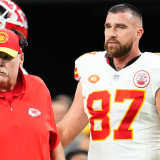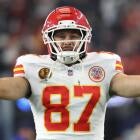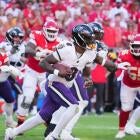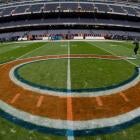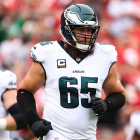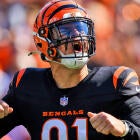Cowboys vs. 49ers: TV, live stream, odds, pick, what to watch for in NFC wild card showdown
Breaking down the Dallas-San Francisco wild card matchup

Troy Aikman. Joe Montana. Emmitt Smith. Steve Young. Michael Irvin. Jerry Rice. Charles Haley. Deion Sanders. Ronnie Lott. Larry Allen. George Seifert. Jimmy Johnson. It's the Cowboys and 49ers, Sunday on CBS.
Whoops. Sorry, we got caught back in the 1990s for a second. This Sunday, in the year 2022, we'll see Dak Prescott and Deebo Samuel, CeeDee Lamb and George Kittle, Amari Cooper and Trent Williams, Tyron Smith and Alex Mack, Fred Warner and Micah Parsons, Nick Bosa and Demarcus Lawrence, Dre Greenlaw and Randy Gregory, Jimmie Ward and Trevon Diggs, Mike McCarthy and Kyle Shanahan, and a whole lot more.
This should be fun. Let's break down the matchup.
How to watch
Date: Sunday, Jan. 16 | Time: 4:30 p.m. ET
Location: AT&T Stadium (Arlington, Texas)
TV: CBS, Nickelodeon | Stream: For CBS broadcast only on Paramount+ (click here)
Follow: CBS Sports App
Odds: Cowboys -3, O/U 51
When the 49ers have the ball
This side of the ball features a fascinating matchup of strengths and weaknesses. The 49ers want to run the ball and hit teams with big gains via the play-action pass. The Cowboys want to destroy your offensive line with their devastating pass rush, forcing your quarterback to rush his throws and get picked off by Trevon Diggs or whoever else jumps the passing lane.
The Dallas defense was not as effective against the run as it was against the pass this season, checking in 16th in rush defense DVOA at Football Outsiders compared with second in pass defense. The Cowboys also did not face very many run games reminiscent of the 49ers. The only team whose offense was all that similar in style, among Dallas opponents, was the Minnesota Vikings. Dallas actually did quite well in that matchup, but it's a pretty small sample.
According to Tru Media, for example, the Cowboys faced the eighth-fewest misdirecting rushing attempts in the NFL this season. San Francisco, meanwhile, was second in misdirection carries and yards, averaging 5.04 yards per carry on those attempts. The 49ers gained at least five yards on 42.8% of those attempts, far better than the 36.1% league average.
Using misdirection is an excellent strategy against the Cowboys, who flow to the ball faster than maybe any defense in the NFL. It is their modus operandi to be extremely aggressive, and if you can get them flowing left and run the ball to the right, there may be a chance for big gains on the ground. The 49ers do that to opposing teams better than any run game in the league.
Elijah Mitchell and Deebo Samuel take advantage of all the bodies flowing in one direction or another to plant their foot in the ground and get up the field extremely quickly, and they both run with tremendous power. Their tackle-breaking ability makes it that much more difficult to stop the 49ers rushing attack.
The Niners, of course, attach their bootleg passing game to their run game. Almost every passing play looks exactly like a run right up until the moment it becomes a pass. The Cowboys were not particularly effective against the bootleg this year: opponents completed 34-of-41 passes for 301 yards, two touchdowns, and a 114.7 passer rating on those plays.
The key for the Cowboys, then, will be generating pressure. They did that better than almost any team in the NFL this season, getting a sack, hit, or hurry on 36.4% of opponent dropbacks. The Niners didn't allow much in the way of pressure (28.8%, seventh-lowest), but the right side of their offensive line is much weaker now than it was for most of the year.
They've got Daniel Brunskill at right guard and Tom Compton at right tackle. Compton will have to deal with Demarcus Lawrence, who has absolutely been wrecking things since returning from his foot injury. Brunskill seems like the most likely target for the Micah Parsons blitzes. He's blown up guys like Brandon Scherff with those blitzes, so Brunskill will have his hands full. The marquee pass-rush matchup is Randy Gregory vs. Trent Williams on the opposite side of the line. Gregory had a fantastic season. Williams is a first-team All-Pro. He's coming off an elbow injury that kept him out of the regular-season finale, though, so it's worth watching whether or not he's at his most effective in this contest.
If Jimmy Garoppolo is able to sit in the pocket and deliver, the Niners should have at least some type of advantages down the field. Dallas surprisingly has a pretty good option to defend George Kittle in breakout safety Jayron Kearse, but if San Francisco can get Kittle matched up against Leighton Vander Esch or even Parsons, there's a chance he could break a big catch-and-run. It would be advisable to challenge Interception King Trevon Diggs with double-moves from Samuel or Brandon Aiyuk, but again, the Niners need to make sure the pocket doesn't get blown up so that Jimmy G has enough time to deliver the ball over the top.
Of course, all of this also depends on Garoppolo not just spontaneously combusting and throwing the ball to the other team even if the protection is good and his man is open. There is perhaps nothing more important in this game than whether or not Garoppolo throws a pick.
When the Cowboys have the ball
Where the 49ers have an advantage in the run game that is based on misdirection, the Cowboys have an advantage in the pass game that simply relies on superior perimeter talent.
Amari Cooper, CeeDee Lamb, Cedrick Wilson, and Dalton Schultz should be able to find openings against the San Francisco secondary -- Cooper and Lamb, in particular. San Francisco's outside corners are much weaker in coverage than slot man K'Waun Williams, safeties Jaquiski Tartt and Jimmie Ward, or linebackers Fred Warner and Dre Greenlaw. Throughout the second half of the season, 49ers opponents have repeatedly picked on rookie corner Ambry Thomas, who has given up big play after big play. (He did, however, come up with the interception that officially clinched San Francisco's playoff spot.)
When Dallas does throw down the field, the results are generally pretty good. The team's best ball-winner on the outside, though, is out for the season. (Michael Gallup tore his ACL in Week 17.) That means the big plays are targeted to Cooper and Lamb, who are not necessarily one-on-one deep ball guys. When they make big plays, it's usually more of the in-breaker and/or crossing route variety, allowing them to catch the ball on the run and make hay after the catch. Lamb is more of a contested catch guy than Cooper (Cooper tends to be a body catcher while Lamb will more often snatch the ball out of the air with his hands), so if the Cowboys do go deep up the sideline, it may be to him.
The 49ers play mostly Cover-1 and Cover-3 (57.6% of coverage snaps, per Tru Media), which are single-high coverages that don't discourage deep passing as much as split-safety looks do. That likely means less of the Dallas passing game will run through Wilson and Schultz on the inside, who have the tougher matchups anyway. The Niners don't typically play static single-high looks, though. They'll often start in a two-high shell and rotate into it, or utilize Cover-6, playing two deep on one side of the field and one deep on the other.
If Prescott begins looking quickly for his checkdowns rather than taking targeted shots down the field, that's not necessarily a great sign for the Cowboys. Of course, the reason that would have to happen is if the 49ers defensive line overwhelms the Dallas offensive line. The Cowboys are generally quite good in pass protection (29.7% pressure rate allowed, eighth-lowest in the NFL), but it's likely that their reputation exceeds their production at the moment -- even if only by a little bit.
The matchups are pretty fascinating, with Nick Bosa rushing off the left side of the line against La'el Collins, Samson Ebukam coming off the other edge against Tyron Smith, and Arik Armstead and D.J. Jones pushing the middle of the pocket against Zack Martin, Tyler Biadasz, and Connor Williams. Look for the 49ers to overload the left side rather than the right, so they leave Martin in the middle of the line blocking nobody while forcing Williams and Biadasz to deal with multiple rushmen.
The Niners typically like to get pressure with their front four, sending blitzes at the NFL's eighth-lowest rate. That's good for them in this matchup, as Prescott devours opponents who send extra rushers. He threw 23 touchdowns against the blitz this season, seven more than any other quarterback in the league. He ranked fifth in EPA per play against the blitz, so it's not like he was feast or famine. If San Francisco's front can't generate pressure on its own and DeMeco Ryans has to give it some help, that will play right into the Cowboys' hands.
Dallas has struggled to run the ball over the second half of the season. It's notable that both Ezekiel Elliott and Tony Pollard are healthy now, as is the offensive line in front of them. But the 49ers are far more vulnerable through the air than on the ground, and the Cowboys would be wise to base their attack around the pass rather than the run.
Prediction: Cowboys 27, 49ers 23


